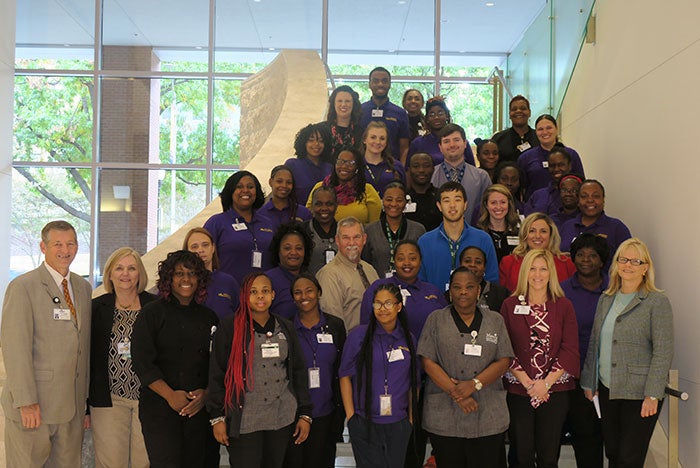Mercy Medical Center combats Baltimore’s high unemployment rate

mWORKS graduates are recruited and trained for careers in health care environmental services, dietary and patient transport.
When civil unrest rocked Baltimore in 2015, three senior staff members at Mercy Medical Center noticed a consistent underlying theme that was contributing to tensions — the city’s high unemployment rate.
“Every article we read talked about unemployment and individuals without career paths,” says Susan Finlayson, senior vice president of operations. “But we have a lot of entry-level jobs that people can do very well in to develop a career in health care.”
Finlayson worked with Stacey Brull, senior director of research, education and informatics, and Robert Beckwith, vice president of support services and construction, to develop mWorks, a program that creates what they call a “failure-proof” career path for those struggling to find good-quality employment in the city.
The free program was launched in 2016 as a two-week course to train students for careers in environmental services (ES), dietary and transport. It has now evolved into a four-week course offered in the spring and fall with the capacity to train 20-25 students each session. The hospital works with nonprofit organization Humanim to help recruit students in addition to its own organic efforts. This year, mWORKS graduated its third cohort.
Beckwith says the first steps in launching the program were to take a deep dive into Mercy’s own operations and work with its nurse educators to develop courses that would result in consistent best practices and maintain Mercy’s quality.
Students, some who say they have not had a job in 10 years, are first trained in vital, interpersonal soft skills. Then they are introduced to entry-level positions within the three departments. Students select the field that suits them best and are matched with coaches who mentor them during the training program and beyond.
For its ES operations, mWORKS uses the Association for the Healthcare Environment’s Certified Healthcare Environmental Services Technician curriculum. Metz Culinary Management, based in Pennsylvania, helped students within the dietary program to attain ServSafe certification. Curriculum for the patient transporter department was developed based on the core principles of the National Association of Healthcare Transport Management. The nurse educators also work with students who have learning disabilities to ensure everyone’s success. Graduating students can use their newfound skills to find employment at Mercy or seek opportunities elsewhere.
“When we started gelling together the curriculum for this program, we wanted to give them skills they could carry with them no matter where they are,” Finlayson explains. “We want them to have those soft skills on how to interview and how to interact with people. We know that those interpersonal skills along with competencies we are teaching them will help them to be successful in their health care careers.”
The program has resulted in 41 new hires and has a 76 percent retention rate.Finlayson says the success of mWORKS has even caught the attention of other departments within the hospital. In fact, Mercy’s materials management director approached the mWorks leader about training future students to work in health care supply chain.
Beckwith says the program’s success proves that it can serve as a model not just internally, but for other urban settings that struggle with the same unemployment issues.
“Facilities can be a very difficult place to recruit for,” Beckwith says. “It’s the same issue in all major cities. With this program, you can recruit employees and make sure they are trained before they hit the floors. This program is not just for Baltimore. It can help the entire country,” he adds



